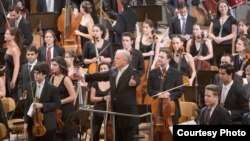The United Nations has designated the West-Eastern Divan Orchestra, made up of musicians from Israel, the Palestinian territories and other parts of the Middle East, as a Global Advocate for Cultural Understanding.
The orchestra was co-founded in 1999 by Argentine-Israeli conductor and pianist Daniel Barenboim and the late Palestinian literary scholar Edward Said as an instrument of peace and tolerance.
Within the orchestra, music is seen as a vehicle of cultural understanding. U.N. Secretary-General Ban Ki-moon said he appreciates the orchestra’s approach in fostering dialogue and tolerance.
“Every performance is a testimony to the power of music to break down barriers, to promote cultural understanding and to build bridges between communities,” Ban said.
The secretary-general said that as a U.N. Global Advocate, "the orchestra will work closely with the United Nations Alliance of Civilizations to build mutual respect among peoples of different cultural and religious identities, highlighting the will of all people around the world to reject extremism and embrace diversity and tolerance.”
Barenboim, who has been a U.N. Messenger of Peace for nine years, said the orchestra would not spare any energy in fulfilling its mission. However, he added, there are limits to what it can do.
“Let’s face it — music cannot bring peace," he said. "It will not solve the problems. It will not solve the terrible crisis we have in Syria at the moment, and all the other conflicts in the world. But music is an example of the necessity of dialogue, because the instruments play one against the other sometimes, and always peacefully.”
Tyme Khleifi, 26, a violinist from the Palestinian city of Ramallah, has spent half her life as a member of the orchestra. She said she agreed that music alone would not solve the world’s problems. She also told VOA that coming from a conflicted part of the world as she does, it is not easy being part of such an orchestra.
“It is not easy to come face to face with human beings you normally grow up viewing or thinking of as your enemy," Khleifi said. "Just confronting that and reckoning with it and coming to terms with it is a huge thing, and so that is why actually every member of the orchestra, the people who decide to come back, are very courageous for doing so and for making that decision.”
Another member of the orchestra, Israeli violinist Guy Braunstein, said it is naive to think music can bring peace, but he said it can break down barriers among communities.
“The acceptance of what we do with the instruments is important," he said. "It should be escorted by the acceptance that we are equal, with and without the instruments.”
The musicians said that ultimately, success would come when the orchestra could play freely in Tel Aviv, Damascus, Beirut, Ramallah or East Jerusalem. The world would be a far better place, they said, if their political leaders knew the joy and fulfillment that comes with playing in concert with one another.












